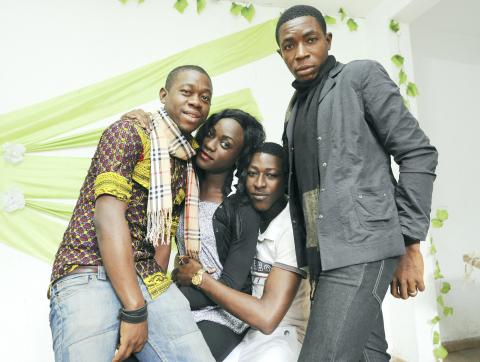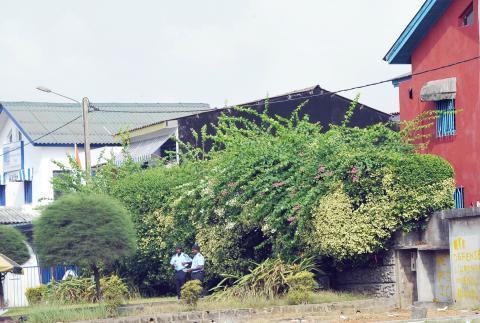No kissing, no petting. As gay bars go, this one is pretty well-behaved. But the crowd packing the Abidjan venue is relaxed and happy to be part of this haven of tolerance on a hostile continent.
“In a gay club, we are much freer than in straight places,” 22-year-old student Jacques tells AFP, looking on as three men sway to Ivorian music on the dance floor.
“We get no strange looks. Here we can unwind, feel at ease and let ourselves go.”

Photo: AFP
One man gently strokes his companion’s neck but displays of affection stop there. The strict social codes prevailing in Ivory Coast apply here too.
The patrons include several transvestites, one a 20-year-old teacher who goes by the name Malika, and who has been living as a woman by night and a man by day for the past three years.
“I live with a friend. Out of respect for his other friends and his job, I live as a man under his roof,” said Malika, wearing discreet makeup with a short wig and clad in an elegant patterned dress.

Photo: AFP
“But when I go about my own business, I am the way I want to be.”
With bars catering for lesbians, gays and transsexuals, the west African country stands out for its tolerance on a continent where homophobia is not just common but widely enshrined into law.
Some 30 African countries have declared homosexuality illegal. The parliaments of Nigeria and Uganda recently passed laws to punish gays with long prison terms — although Uganda’s President Yoweri Museveni blocked the harsh legislation.
In Mauritania, homosexuality is punishable by death.
“It’s no paradise here, but it’s a lot better than in other countries,” Malika said.
The picture is far from rosy, though: one of her transsexual friends found it difficult to get hospital treatment after she was stabbed in the chest.
And late last month dozens of homophobic protesters attacked the Abidjan offices of gay rights group Alternative Cote d’Ivoire, bashing in the doors and looting equipment.
Moussa, who manages one of the three gay bars in Ivory Coast’s economic capital, told of insults from passers-by and threats from the owner of the premises to withdraw the lease.
NO HOMOPHOBIC ACTS
And yet, in Abidjan, it remains possible to be gay — making it something of an El Dorado for gays from elsewhere in Africa, in Malika’s words.
That was certainly the case for Marinette, a bisexual woman who felt “threatened” in her hometown in Cameroon after several lesbian relationships, and came to Abidjan to sample the freedom of the city.
“This is nothing like my country, where one of my friends was threatened with rape because she had never slept with a guy,” said the young woman in her 30s, in a body-hugging red dress.
What makes Ivory Coast so much more tolerant than neighboring countries, where homosexuality is often perceived as deviant and shameful?
“Because we have not yet been subjected to homophobic legislation,” argued Fabrice, 26, who handles judicial affairs for Alternative Cote d’Ivoire.
A government official suggested that Ivory Coast, which is recovering from a bloody political and military crisis that ended in 2011, had more pressing matters to address than its citizens’ sexual orientation.
“There is considerable unemployment, and organized crime on a large scale. At the end of the day, homosexuality is a minor issue,” agreed Fabrice.
Even in country villages, where tradition reigns strong, homosexuality is “stigmatized without going too far”, he said.
“There can be criticism, and verbal abuse, but it’s hardly sharia law.”
Yet for all that gays, lesbians and transsexuals lay claim to a degree of freedom in Ivory Coast, many still choose to keep their sexuality under wraps.
“Tonight, everybody is gay,” said Armand, a 32-year-old waiter at the bar. “But tomorrow morning, we’ll pretend we don’t know one another. Everyone hides who they are.”

In the March 9 edition of the Taipei Times a piece by Ninon Godefroy ran with the headine “The quiet, gentle rhythm of Taiwan.” It started with the line “Taiwan is a small, humble place. There is no Eiffel Tower, no pyramids — no singular attraction that draws the world’s attention.” I laughed out loud at that. This was out of no disrespect for the author or the piece, which made some interesting analogies and good points about how both Din Tai Fung’s and Taiwan Semiconductor Manufacturing Co’s (TSMC, 台積電) meticulous attention to detail and quality are not quite up to

April 21 to April 27 Hsieh Er’s (謝娥) political fortunes were rising fast after she got out of jail and joined the Chinese Nationalist Party (KMT) in December 1945. Not only did she hold key positions in various committees, she was elected the only woman on the Taipei City Council and headed to Nanjing in 1946 as the sole Taiwanese female representative to the National Constituent Assembly. With the support of first lady Soong May-ling (宋美齡), she started the Taipei Women’s Association and Taiwan Provincial Women’s Association, where she

Chinese Nationalist Party (KMT) Chairman Eric Chu (朱立倫) hatched a bold plan to charge forward and seize the initiative when he held a protest in front of the Taipei City Prosecutors’ Office. Though risky, because illegal, its success would help tackle at least six problems facing both himself and the KMT. What he did not see coming was Taipei Mayor Chiang Wan-an (將萬安) tripping him up out of the gate. In spite of Chu being the most consequential and successful KMT chairman since the early 2010s — arguably saving the party from financial ruin and restoring its electoral viability —

It is one of the more remarkable facts of Taiwan history that it was never occupied or claimed by any of the numerous kingdoms of southern China — Han or otherwise — that lay just across the water from it. None of their brilliant ministers ever discovered that Taiwan was a “core interest” of the state whose annexation was “inevitable.” As Paul Kua notes in an excellent monograph laying out how the Portuguese gave Taiwan the name “Formosa,” the first Europeans to express an interest in occupying Taiwan were the Spanish. Tonio Andrade in his seminal work, How Taiwan Became Chinese,